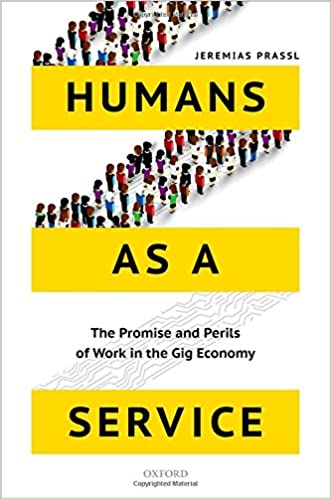Andrei Rogobete: “Humans as a Service” by Jeremias Prassl

Jeremias Prassl is a Fellow of Magdalen College and an Associate Professor in the Faculty of Law at Oxford University. He advises public and private sector organisations on regulating the gig economy. In his book entitled Humans as a Service, Prassl re-evaluates the merits and pitfalls of the “gig economy” and seeks to discover ways that society might benefit from the gig economy without falling into “extreme forms” of labour force commodification (page 4).
For those of you wondering what the “gig economy” is, Prassl describes it as “…an ever-growing number of start-ups, […] online platforms and mobile apps [that] connect consumers, businesses, and workers – often for jobs lasting no longer than a few minutes” (page 2). The term “gig” invokes an artist’s gig for a time-limited and (usually) one-off performance.
This new and growing space labelled as the “gig economy” poses both opportunities and challenges. On one hand the digital space has enabled an unparalleled level of growth and innovation in the exchange of goods, services and other forms of capital at instant speeds – creating value for all participants (page 3). On the other hand, critics argue that a deregulated gig economy leads to a commodification of labour whereby “those with money will be able to […] hire those without money by forcing an online bidding war to see who will charge the least for their labour” (Ibid.).
The book seems to be written with the “educated reader” in mind. The author makes extensive use of practical examples whilst limiting overuse of legal jargon, which makes the book accessible to the specialist and non-specialist alike. The contents are structured among six main chapters and while we will not detail each in part here, we will touch upon some of the key points that may warrant further discussion.
Chapters I and II lay out the foundations of the gig economy: its internal workings, the role of digitalisation, the role of regulation (or lack thereof), and so on. Prassl points out that large actors within the gig economy are mistakenly given the benefit of the doubt when found guilty of mistreating their employees (or contractors). This is largely done by hiding under the “innovation” banner and perhaps abusing the public’s perception of innovation as a natural industry disruptor. Once section in the second chapter highlights the discrepancy between the authorities’ response to Mike Ashley’s Sports Direct zero-hours contracts scandal, and the ill treatment of ride sharing drivers for Lyft & Co. in the US (page 41-42). Prassl asks, “Why, then, is it that Mike Ashley was (rightly) subjected to parliamentary humiliation, whereas the sharing economy is celebrated by its very own cross-party caucus in the US Congress?” (Ibid.).
Chapters III and IV continue the discussion and look at life within the gig economy and the dilemmas that innovation can give rise to, particularly in respect to applying the appropriate level of regulation. Prassl points out an “innovation paradox”: “…it is undoubtedly true that key elements behind the rise of the sharing economy are completely new – first and foremost, their reliance on the internet, smartphone apps and digital platforms […] When it comes to work in the on-demand economy, on the other hand, the story is a very different one” (page 72). It is the capacity to accurately differentiate between the truly novel and the outwardly novel that policymakers will need if they are to develop an appropriate regulatory framework.
Chapters V and VI conclude the discussion by looking at various approaches of harnessing the benefits of the gig economy whilst restoring and protecting workers’ rights. Prassl argues that a key element is ensuring that everyone plays by the same rules, “…we need to redress structural imbalances and create a level playing field – with employment law at its foundation” (page 119).
To conclude, Humans as a Service by Jeremias Prassl is a great overview of the opportunities and challenges that the gig economy brings for all stakeholders involved. However, (and given that this piece of work is primarily written from a legal perspective), one cannot help but feel that insufficient voice has been given to the non-legal (or non-regulatory) solutions to the problems facing the gig economy. Some of these might include: allowing for market corrections and re-structuring, online reputation management, the implications of reputation damage, the increasing role of independent reviews in online decision-making, and so on. This would encompass a much broader discussion that the book sorely misses.
That is not to say these are unequivocal answers – yet a more thorough investigation into the non-regulatory means of transforming the gig economy would have benefited the book greatly. If readers can look beyond the “regulation is the answer” approach (which no doubt, some will), Humans as a Service is a good and informative read. It is just a shame that it missed the opportunity of being an excellent read. Perhaps an economist’s response to the book would help – let’s hope that we see such endeavour in the future.
Prassl, Jeremias. “Humans as a Service: The Promise and Perils of Work in the Gig Economy” was first published in 2018 by Oxford University Press (ISBN:9780192517388). 199pp.
Andrei E. Rogobete is the Associate Director of the Centre for Enterprise, Markets & Ethics. For more information about Andrei please click here.

